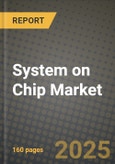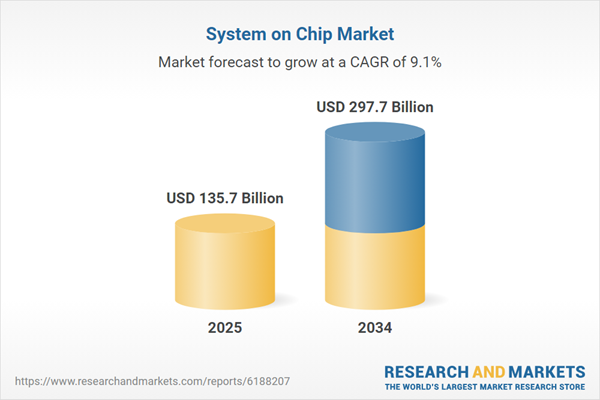The System on Chip (SoC) market has emerged as a central force in the evolution of modern electronics, integrating all components of a computer or other electronic systems into a single chip. SoCs combine CPU, GPU, memory, interfaces, and other essential elements, offering compact, energy-efficient, and high-performance solutions for various applications. These chips are fundamental to devices such as smartphones, tablets, smart TVs, automotive infotainment systems, wearables, and increasingly, industrial and IoT devices. As demand for edge computing, artificial intelligence (AI), and low-latency data processing continues to rise, SoCs are being tailored to meet specialized performance and power requirements across diverse verticals. The market is characterized by intense innovation and competition among semiconductor giants and emerging players, with design flexibility, manufacturing efficiency, and system-level optimization playing key roles in differentiating products and capturing market share.
The System on Chip market witnessed rapid advancements, driven by increased demand across mobile devices, automotive electronics, and connected industrial systems. Consumer electronics manufacturers released new generations of smartphones and tablets equipped with AI-accelerated SoCs to enhance photography, gaming, and voice assistant functionalities. Automotive OEMs ramped up adoption of SoCs in electric and autonomous vehicles, integrating sensor fusion, ADAS, and infotainment capabilities onto a single chip to reduce power consumption and board space. In the industrial sector, edge AI applications led to growing uptake of customized SoCs designed for machine learning inference and low-latency processing at the edge. Major players also focused on transitioning to smaller process nodes - such as 5nm and 3nm architectures - improving performance-per-watt while managing thermal outputs. Strategic partnerships between fabless design houses and foundries intensified as companies sought to secure supply chains amid global chip shortages and geopolitical uncertainties.
The SoC market is poised for deeper integration with next-gen technologies such as 6G, quantum computing interfaces, and neuromorphic processors. Edge AI will remain a strong demand driver, as sectors like healthcare, smart cities, and logistics prioritize low-power, intelligent processing units for localized decision-making. Custom silicon development will gain momentum, with enterprises designing proprietary SoCs tailored for specific workloads, especially in data centers and advanced robotics. Multi-chiplet packaging and heterogeneous computing approaches will become increasingly mainstream, allowing SoC designs to push past traditional integration limits while maintaining performance and efficiency. However, challenges around escalating R&D costs, design complexity, and time-to-market pressure will test the agility of even established players. Companies that can align silicon innovation with software-defined functionality and long-term scalability will shape the next era of intelligent, compact, and connected electronics.
Key Insights: System On Chip Market
- Proliferation of edge AI and inference processing is driving demand for SoCs optimized for real-time, on-device intelligence across smart devices and industrial applications.
- Adoption of 3nm and advanced packaging technologies is enhancing energy efficiency and computational density in mobile, automotive, and high-performance computing (HPC) segments.
- Increased focus on heterogeneous SoC architectures that combine CPUs, GPUs, NPUs, and other accelerators for workload-specific optimization.
- Growth in custom-designed SoCs by tech giants and hyperscalers is reshaping the semiconductor landscape through in-house chip development initiatives.
- Collaborations between foundries and fabless design firms are accelerating chip design innovation and ensuring supply chain resilience amid ongoing global semiconductor constraints.
- Rising demand for compact, energy-efficient chips in mobile, wearables, and consumer electronics is driving SoC integration over discrete component systems.
- Expansion of connected and autonomous vehicles is fueling adoption of SoCs in ADAS, infotainment, and in-vehicle connectivity platforms.
- Surge in edge computing and AI applications requires SoCs with high-speed processing, low latency, and low power consumption.
- Growth in IoT ecosystems is increasing the need for cost-effective, highly integrated SoCs that support real-time control and wireless communication.
- As SoC designs become increasingly complex and manufacturing nodes shrink, rising R&D and fabrication costs pose a significant barrier, particularly for mid-tier players, requiring strategic investment in EDA tools, IP licensing, and collaborative design approaches to remain competitive and reduce time-to-market.
System On Chip Market Segmentation
By Type
- Digital System On Chips
- Mixed-Signal System On Chips
- Analog System On Chips
By Application
- Home Appliances
- Portable Electronic Devices
- Advanced Driver Assistance Systems
- Medical Devices
- Radio-Frequency Devices
- Power-Electronic Devices
- Wired and Wireless Communication Devices
- Wearable Devices
- Other Applications
By End-Use Industry
- Consumer Electronics
- Automotive and Transportation
- Information Technology (IT) and Telecommunication
- Aerospace and Defense
- Healthcare
- Power and Utility
- Other End Use Industries
Key Companies Analysed
- Apple Inc.
- Samsung Electronics Co. Ltd.
- Huawei Technologies Co. Ltd.
- Sony Corporation
- Taiwan Semiconductor Manufacturing Company Limited
- Intel Corporation
- Qualcomm
- Broadcom Inc.
- Micron Technology Inc.
- NVIDIA Corporation
- Toshiba Corporation
- Advanced Micro Devices Inc.
- Texas Instruments Incorporated
- MediaTek Inc.
- STMicroelectronics N.V.
- Infineon Technologies AG
- NXP Semiconductors N.V.
- Renesas Electronics Corporation
- onsemi
- Marvell Technology Group Ltd.
- Arm Limited
System On Chip Market Analytics
The report employs rigorous tools, including Porter’s Five Forces, value chain mapping, and scenario-based modeling, to assess supply-demand dynamics. Cross-sector influences from parent, derived, and substitute markets are evaluated to identify risks and opportunities. Trade and pricing analytics provide an up-to-date view of international flows, including leading exporters, importers, and regional price trends.Macroeconomic indicators, policy frameworks such as carbon pricing and energy security strategies, and evolving consumer behavior are considered in forecasting scenarios. Recent deal flows, partnerships, and technology innovations are incorporated to assess their impact on future market performance.
System On Chip Market Competitive Intelligence
The competitive landscape is mapped through proprietary frameworks, profiling leading companies with details on business models, product portfolios, financial performance, and strategic initiatives. Key developments such as mergers & acquisitions, technology collaborations, investment inflows, and regional expansions are analyzed for their competitive impact. The report also identifies emerging players and innovative startups contributing to market disruption.Regional insights highlight the most promising investment destinations, regulatory landscapes, and evolving partnerships across energy and industrial corridors.
Countries Covered
- North America - System On Chip market data and outlook to 2034
- United States
- Canada
- Mexico
- Europe - System On Chip market data and outlook to 2034
- Germany
- United Kingdom
- France
- Italy
- Spain
- BeNeLux
- Russia
- Sweden
- Asia-Pacific - System On Chip market data and outlook to 2034
- China
- Japan
- India
- South Korea
- Australia
- Indonesia
- Malaysia
- Vietnam
- Middle East and Africa - System On Chip market data and outlook to 2034
- Saudi Arabia
- South Africa
- Iran
- UAE
- Egypt
- South and Central America - System On Chip market data and outlook to 2034
- Brazil
- Argentina
- Chile
- Peru
Research Methodology
This study combines primary inputs from industry experts across the System On Chip value chain with secondary data from associations, government publications, trade databases, and company disclosures. Proprietary modeling techniques, including data triangulation, statistical correlation, and scenario planning, are applied to deliver reliable market sizing and forecasting.Key Questions Addressed
- What is the current and forecast market size of the System On Chip industry at global, regional, and country levels?
- Which types, applications, and technologies present the highest growth potential?
- How are supply chains adapting to geopolitical and economic shocks?
- What role do policy frameworks, trade flows, and sustainability targets play in shaping demand?
- Who are the leading players, and how are their strategies evolving in the face of global uncertainty?
- Which regional “hotspots” and customer segments will outpace the market, and what go-to-market and partnership models best support entry and expansion?
- Where are the most investable opportunities - across technology roadmaps, sustainability-linked innovation, and M&A - and what is the best segment to invest over the next 3-5 years?
Your Key Takeaways from the System On Chip Market Report
- Global System On Chip market size and growth projections (CAGR), 2024-2034
- Impact of Russia-Ukraine, Israel-Palestine, and Hamas conflicts on System On Chip trade, costs, and supply chains
- System On Chip market size, share, and outlook across 5 regions and 27 countries, 2023-2034
- System On Chip market size, CAGR, and market share of key products, applications, and end-user verticals, 2023-2034
- Short- and long-term System On Chip market trends, drivers, restraints, and opportunities
- Porter’s Five Forces analysis, technological developments, and System On Chip supply chain analysis
- System On Chip trade analysis, System On Chip market price analysis, and System On Chip supply/demand dynamics
- Profiles of 5 leading companies - overview, key strategies, financials, and products
- Latest System On Chip market news and developments
Additional Support
With the purchase of this report, you will receive:- An updated PDF report and an MS Excel data workbook containing all market tables and figures for easy analysis.
- 7-day post-sale analyst support for clarifications and in-scope supplementary data, ensuring the deliverable aligns precisely with your requirements.
- Complimentary report update to incorporate the latest available data and the impact of recent market developments.
This product will be delivered within 1-3 business days.
Table of Contents
Companies Mentioned
- Apple Inc.
- Samsung Electronics Co. Ltd.
- Huawei Technologies Co. Ltd.
- Sony Corporation
- Taiwan Semiconductor Manufacturing Company Limited
- Intel Corporation
- Qualcomm
- Broadcom Inc.
- Micron Technology Inc.
- NVIDIA Corporation
- Toshiba Corporation
- Advanced Micro Devices Inc.
- Texas Instruments Incorporated
- MediaTek Inc.
- STMicroelectronics N.V.
- Infineon Technologies AG
- NXP Semiconductors N.V.
- Renesas Electronics Corporation
- onsemi
- Marvell Technology Group Ltd.
- Arm Limited
Table Information
| Report Attribute | Details |
|---|---|
| No. of Pages | 160 |
| Published | October 2025 |
| Forecast Period | 2025 - 2034 |
| Estimated Market Value ( USD | $ 135.7 Billion |
| Forecasted Market Value ( USD | $ 297.7 Billion |
| Compound Annual Growth Rate | 9.1% |
| Regions Covered | Global |
| No. of Companies Mentioned | 21 |









